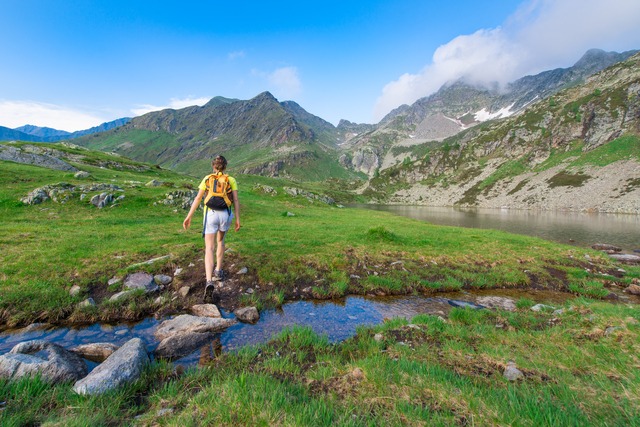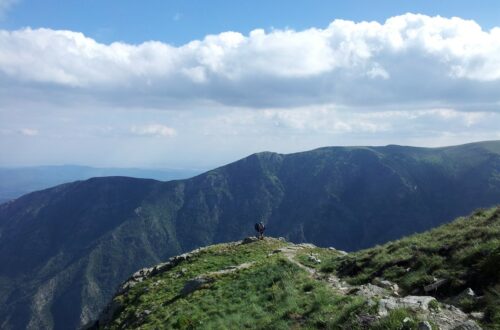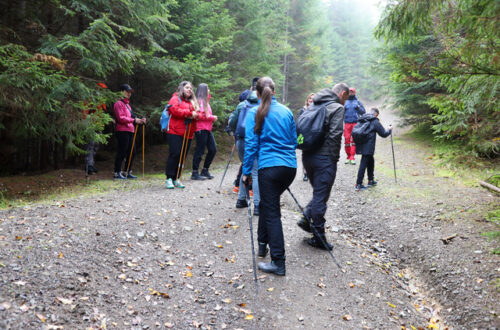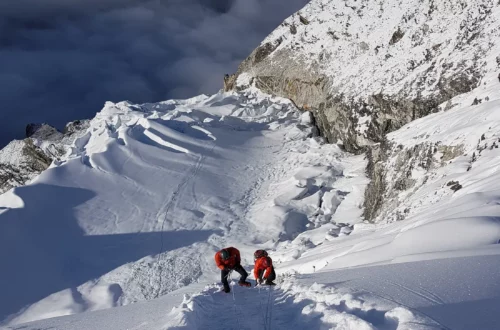
Trek Your Way to Fitness: Ramsay Banna’s Guide to Getting Fit Through Trekking”
Trekking is more than just an adventurous outdoor activity; it’s an excellent way to improve your overall fitness. Whether you’re exploring local trails or embarking on multi-day treks in the wilderness, trekking offers a full-body workout, mental rejuvenation, and a deep connection to nature. As a professional sports writer and experienced trekker, I, Ramsay Banna, am here to share how trekking can help you get fit while enjoying the great outdoors.
The Physical Benefits of Trekking
Trekking engages nearly every muscle group in your body. Each step challenges your endurance, strength, and balance, making it a holistic form of exercise. Here’s how it helps with fitness:

1. Cardiovascular Endurance
Climbing hills and navigating uneven terrain increases your heart rate, improving cardiovascular endurance. Regular trekking sessions can help lower blood pressure, boost circulation, and increase lung capacity. The varying intensities during a trek act as a natural form of interval training, which helps burn calories and improve stamina over time.
2. Strength and Muscle Toning
Trekking works your legs, core, and even your upper body when you’re carrying a backpack. The constant uphill and downhill movements engage muscles in your quads, hamstrings, glutes, and calves. Using trekking poles can also strengthen your arms and shoulders while stabilizing your movements.
3. Balance and Coordination
When trekking through uneven surfaces, your body must adapt to maintain stability. This improves your balance and coordination, enhancing core strength and proprioception. Trekking teaches you how to move efficiently and safely in challenging environments, which translates to better posture and body control in daily life.
4. Weight Loss
Trekking is a calorie-burning activity that can contribute to significant weight loss if done consistently. A day of trekking can burn anywhere from 1,000 to 2,000 calories depending on the intensity of the terrain and the weight of your pack. Combine this with a healthy diet, and trekking becomes a natural way to shed excess weight while enjoying stunning scenery.
Mental Health Benefits
The fitness benefits of trekking extend beyond the physical. Trekking is also an excellent way to de-stress, improve mental clarity, and boost overall well-being.
1. Stress Reduction
Spending time in nature has been shown to reduce stress levels and lower cortisol. The rhythmic nature of walking combined with the peace and quiet of the wilderness helps clear the mind and relieve anxiety. Trekking also promotes mindfulness, as you focus on the terrain and your surroundings, pulling your attention away from daily worries.
2. Boosting Mental Resilience
Trekking often requires pushing past physical and mental barriers, especially on longer or more difficult trails. Completing a tough trek fosters a sense of accomplishment and builds mental resilience. The challenges of trekking, from weather conditions to tough climbs, teach you how to stay focused, determined, and adaptable.
How to Get Started with Trekking for Fitness
Trekking is accessible to people of all fitness levels. Whether you’re a beginner or a seasoned hiker, there are trails and techniques to suit your fitness goals.
1. Start Small and Build Gradually
For beginners, start with local trails that are relatively short and have manageable terrain. Gradually increase the length and difficulty of your treks as your fitness improves. Remember, consistency is key.
2. Invest in the Right Gear
A good pair of trekking shoes is essential for comfort and injury prevention. Lightweight clothing, hydration systems, and trekking poles will also enhance your experience. The right gear can make all the difference when it comes to staying safe and comfortable during your treks.
3. Combine Trekking with Other Forms of Exercise
While trekking is a fantastic workout, incorporating other forms of exercise, such as strength training and flexibility work, will help improve your overall fitness and reduce the risk of injury. Activities like yoga or Pilates can help stretch and strengthen the muscles that trekking targets.
Trekking for All Ages and Abilities
One of the great things about trekking is that it’s suitable for people of all ages and fitness levels. Whether you’re young and fit or looking for a low-impact exercise in your later years, trekking can be adjusted to your pace and capability. It’s a sustainable way to stay active throughout life, promoting longevity and overall health.
Why Trekking is Ideal for Fitness Enthusiasts
For fitness enthusiasts, trekking offers a refreshing alternative to gym workouts or running routines. It’s dynamic, ever-changing, and rewarding both physically and mentally. The variety in terrains—from mountains to forests, coastal paths, and desert treks—means that you’ll never get bored. Plus, trekking gives you the opportunity to explore new environments, adding an element of adventure to your fitness routine.
Conclusion: Trekking as a Fitness Lifestyle
Trekking offers a unique combination of physical challenge and mental rejuvenation. As an outdoor enthusiast and professional writer, I’ve found that trekking not only builds strength and endurance but also fosters mental clarity and peace. Whether you’re looking to improve your fitness, reduce stress, or embark on an adventure, trekking is a lifestyle that delivers on all fronts.
So lace up your boots, grab your backpack, and hit the trails—because the journey to fitness is just a trek away.
For more information contact Ramsay Banna




